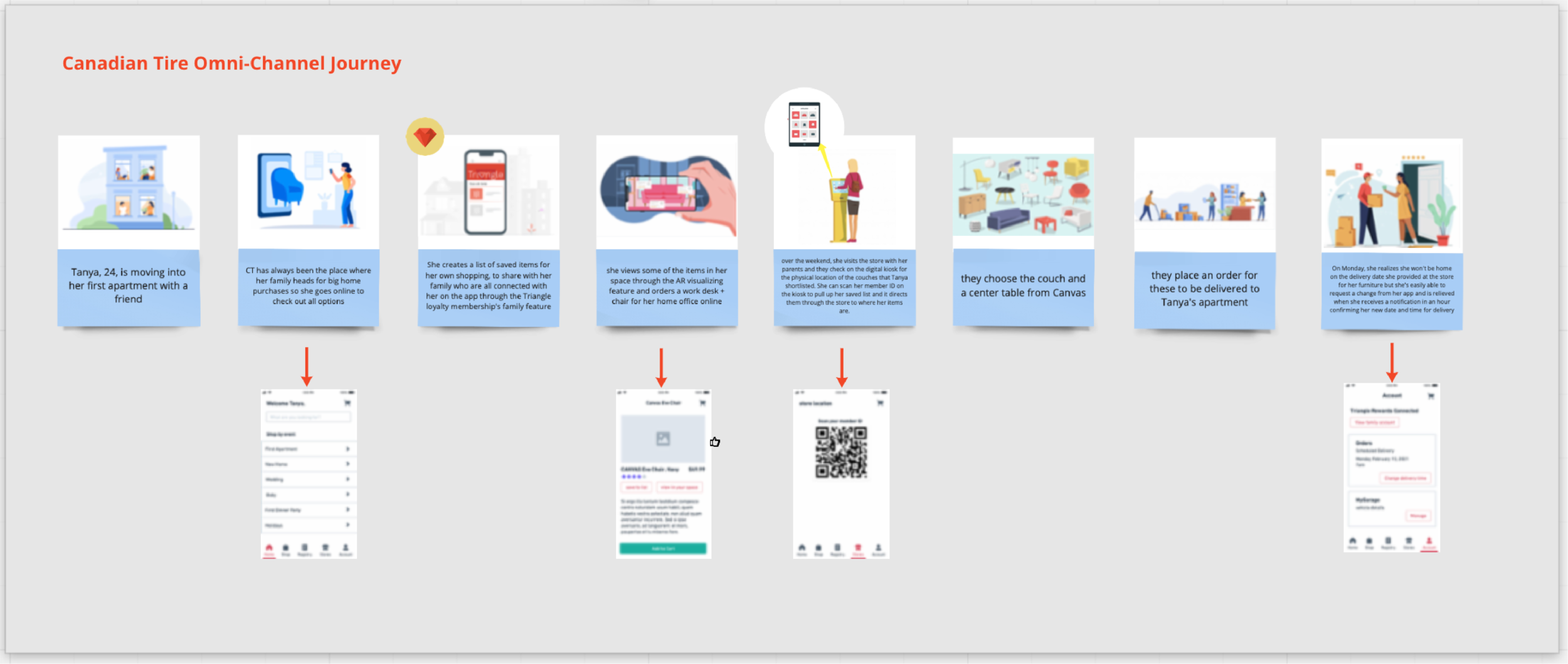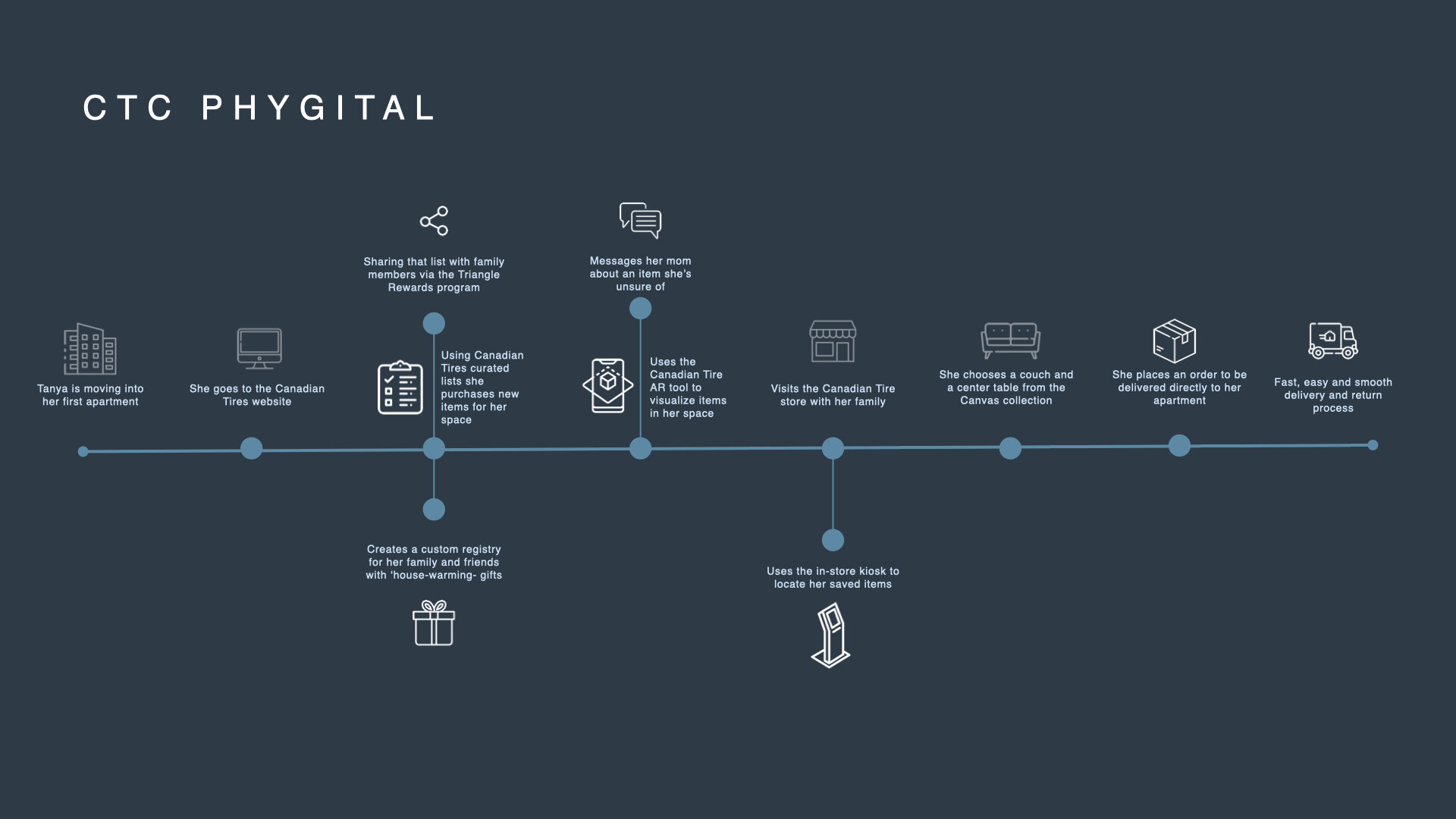Building a bridge between longstanding traditions and relevance for the future
A retail giant wanted to explore its next phase of innovation through business design. Our winning solution was an omnichannel strategy rooted in a service design mindset, bridging frictionless experiences with human connections.
Winners among 30+ teams from top design and business schools in North America and Europe
MY ROLE
Researcher
Strategist
Analyst
Storyteller
METHODS
Design Research
Data Analysis
Rapid Prototyping
TEAM
Jesse Flores
Ra’d Jumean
Rashina Bhula
Savita Singh
Sneha Guntaka
PARTNERS
Canadian Tire is a beloved brand, woven into the fabric of Canadian life for nearly a century. The task set for us in this 6-week challenge was:
“What might Canadian Tire do to package and deliver viable solutions, centered around their portfolio of own-brands, that deliver greater value to consumers, differentiate themselves in the market, and grow their role as a trusted brand?”
The challenge was focused on solutions implementable in the next 12-18 months.
UNDERSTANDING THE LANDSCAPE
Our design journey began by trying to understand where Canadian Tire is today and how it got there.
We spent over 40 hours doing desk research, reviewing social media accounts for customer engagement, looking at competitors in the field, studying retail and e-commerce trends, and understanding historical comparisons to other big box stores. We spoke to consumers in Canada and the US about their retail experiences as well as experts in the e-commerce space.
With over 500 retail stores across the country, Canadian Tire has been focused on a brick & mortar strategy, with a store within 10 mins driving distance of 90% of Canadians. The Covid-19 pandemic tested this reliance on physical retail, especially in the face of competitors such as Amazon and Walmart enhancing their digital and convenience offerings.
RAPID PROTOTYPING & STARTER CONCEPTS
As our project window was relatively brief, we started with some rapid idea testing and brainstorming with Canadian Tire customers early on in the process. This allowed us to refine our understanding of the users’ relationship with the brand while following a fail fast and early approach.
Two broad personas emerged from our conversations:
The starter concepts and personas helped us generate more comprehensive insights about the role that Canadian Tire plays in its consumers’ lives:
Based on these insights, and user feedback, we reframed the problem to reflect their critical challenge at the moment:
We synthesized our learnings from iterative testing to craft our strategy and solution recommendations.
STRATEGY & SOLUTION RECOMMENDATIONS
Bridging the gaps and embracing an omnichannel world
Our three-pronged strategy to bring Canadian Tire into its next phase:
Leverage predictive analytics to automate low-involvement purchases. Create automated purchase cycles for routine categories like auto maintenance, gardening, and appliance maintenance, that Canadian Tire is most relied upon for. This can be activated through an auto-refill service via app reminders and a frictionless choice, purchase, and pick-up journey.
Leverage the vast Triangle loyalty program which boasts a third of the Canadian population as its members. Customer acquisition for digital products is typically a huge cost for brands. Canadian Tire can tap into its advantage of an existing network to drive app and digital adoption.
Enhancing the overall experience through a continuous, omnichannel shopping journey where users seamlessly pick up from wherever they left off in the store or online.
Bringing this strategy into focus for the next 12-18 months, we proposed a service design experience developed from our tested and refined concepts.
This service experience was designed to replicate the joys of physical retail, like discovery, and then layering these with enhancements made possible by technology, like co-creation and collective decision-making with a physically distributed family.
Highlights of this solution included ‘Triangle Family’, with features to recreate the Canadian Tire experience where the entire family shopped together, and ‘Co-created by Canadians’ an idea that built upon the brand’s pillar of community while simultaneously providing millennials the curated, authentic experiences they love.
CTC Phygital will bridge three different gaps for the brand: the one between Canadian Tire’s physical and digital experiences, multiple generations of consumers with competing perspectives, and ultimately between the jobs and joys of shopping at Canadian Tire.
FEASIBILITY & VIABILITY
Having tested the desirability of our concepts, we analyzed the feasibility & viability of our proposed solutions. An opportunity matrix helped us categorize industry table stakes vs. offerings that delivered the highest customer value. Estimated cost projections were broken down by different elements and features and while also considering direct costs and overheads.
A roll-out plan over 18 months began with research and planning and laid out the launches of key features of the Phygital experience with gradual investments and feedback loops built in as each component of the offering was rolled out.
While our suggested roadmap will elevate the Canadian Tire experience in the immediate term, adopting a service design mindset as an organization will ensure strategic advantage for the next decade.
Key takeaways:
We went into the competition suspecting that never having set foot in a Canadian Tire store would be a disadvantage for us as a team. On the contrary, we brought an outsider’s perspective, free of preconceived notions of what Canadian Tire, sometimes perceived as an outdated brand, could or could not do. We benchmarked our recommendations against what any global retail leader ought to be considering.
The importance of a multidisciplinary team with complementary skills from managing design firms to marketing strategy, consulting to visual design, that underpinned our approach and solutions.
Our complete journey, presented at the finals of the Rotman Design Challenge ‘21, can be viewed here:
















